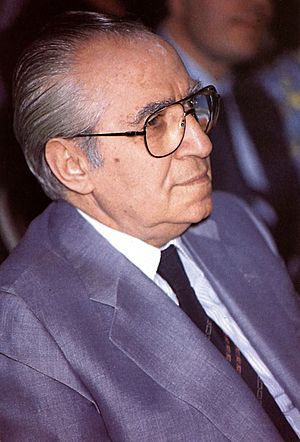Ioannis Alevras facts for kids
Quick facts for kids
Ioannis Alevras
Ιωάννης Αλευράς |
|
|---|---|
 |
|
| Acting President of Greece | |
| In office 10 March 1985 – 30 March 1985 |
|
| Prime Minister | Andreas Papandreou |
| Preceded by | Konstantinos Karamanlis |
| Succeeded by | Christos Sartzetakis |
| Speaker of the Hellenic Parliament | |
| In office 17 November 1981 – 3 July 1989 |
|
| Preceded by | Dimitrios Papaspyrou |
| Succeeded by | Athanasios Tsaldaris |
| Personal details | |
| Born | 1912 Messini, Kingdom of Greece |
| Died | 6 April 1995 (aged 82–83) Athens, Greece |
| Political party | Centre Union (Before 1974) Panhellenic Socialist Movement (1974–1995) |
| Spouse | Christina Alevra |
Ioannis Alevras (Greek: Ιωάννης Αλευράς; 1912 – 6 April 1995) was a Greek politician. He was a member of the Panhellenic Socialist Movement party. He also served as the Speaker of the Hellenic Parliament. In March 1985, he was the acting President of Greece.
Contents
Early Life and Work
Before he became a politician, Ioannis Alevras worked at the Bank of Greece. He was a strong supporter of workers' rights. He helped create OTOE in 1955. OTOE is a group for bank employees in Greece. Alevras led this group for many years. It brought together different worker unions.
Becoming a Member of Parliament
Alevras was first chosen to be a Member of Parliament (MP) in 1963. He ran with the Center Union party. His party won the election by a small number of votes. Georgios Papandreou became the Prime Minister.
Because no party had a clear majority, another election was held in 1964. Alevras was re-elected as an MP. This time, his party won by a lot. They got 171 out of 300 seats in Parliament.
In 1965, there was a big political issue called the Aspida scandal. It involved some army officers. Alevras defended Andreas Papandreou, who was also an MP and the son of the Prime Minister. This scandal caused the government to fall.
The Parliament stayed in place until 1967. Then, the military took control of Greece. This was a difficult time. Alevras was put in prison because he stood up against the new military government.
Joining PASOK
After the military rule ended in 1974, Alevras returned to politics. He joined a new party called the Panhellenic Socialist Movement (PASOK). This party was led by Andreas Papandreou.
In the 1974 election, Alevras was re-elected. Only 12 MPs from his new party were elected that year. PASOK came in third place.
He was re-elected again in 1977. This time, PASOK came in second place. Their popularity kept growing. In the 1981 election, PASOK won the most seats. Andreas Papandreou became Prime Minister. Alevras was chosen to be the Speaker of the Greek Parliament. The Speaker leads the meetings in Parliament.
Serving as Acting President
In 1985, the President, Konstantinos Karamanlis, resigned. According to the rules, Alevras became the acting President. He served from March 10 to March 30, 1985.
There was a discussion about whether he could vote for the new President while he was acting President. Christos Sartzetakis was elected President by a very close vote. Alevras's vote was important for Sartzetakis to win.
Later Political Years
Later in 1985, PASOK won another election. Papandreou remained Prime Minister. Alevras was elected Speaker of Parliament for a second time.
In 1989, there was another election. No single party won enough votes to form a government alone. New Democracy and another party formed a temporary government. Alevras was re-elected as an MP.
A few months later, this government changed. More elections were held in November 1989. Again, no party won a clear majority. Different parties had to work together to form a government. Alevras was re-elected again.
In 1990, another election took place. New Democracy won enough votes to form its own government. Constantine Mitsotakis became Prime Minister. Alevras was re-elected as an MP.
The Mitsotakis government lasted about three years. There was a lot of public discussion about the name of the neighboring country, Republic of Macedonia. This issue caused some MPs to leave the government.
In 1993, PASOK won the elections. Andreas Papandreou became Prime Minister again. Alevras was elected as an MP for the tenth and final time.
Ioannis Alevras passed away on April 6, 1995, at the age of 83. He had a state funeral, which means he was honored like a Prime Minister.
See also
 In Spanish: Ioannis Alevras para niños
In Spanish: Ioannis Alevras para niños
 | George Robert Carruthers |
 | Patricia Bath |
 | Jan Ernst Matzeliger |
 | Alexander Miles |

